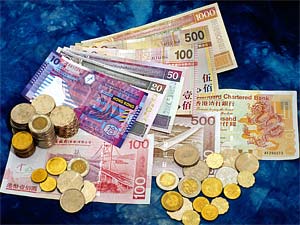Sacked Asian expats sit out slump in the sunshine
 Hong Kong - A black joke doing the rounds in Asian financial circles goes like this: Question: "What's the definition of an optimist?" Answer: "A banker who has five shirts ironed on a Sunday."
Hong Kong - A black joke doing the rounds in Asian financial circles goes like this: Question: "What's the definition of an optimist?" Answer: "A banker who has five shirts ironed on a Sunday."
It is a joke Barry Emmerton - who lost his 15,500-US-dollar-a month job as an interest rates derivatives specialist - can afford to smile at, even though the shirt question is already irrelevant for him.
Today, instead of waking up to the prospect of another nerve-wracking week in Hong Kong's money markets, the
34-year-old Briton is listening to the sound of the sea in a tropical beach house in the Philippines with his wife and
4-year-old daughter.
Earlier this month, he handed over the keys to his high-rent Hong Kong apartment, put furniture and belongings into storage and, with just three small suitcases, a suit bag and a laptop computer, set out with his family on the adventure of a lifetime.
Emmerton is one of a growing number of expatriates who have lost well-paid jobs in the financial sector and, rather than return home, put their worldly possessions in storage and head off to make the most of their unexpected freedom.
Two major Hong Kong relocation companies say they have seen a sharp rise in orders for storage facilities that far outstrip calls and orders from expatriates intent on shipping their things back home.
For Emmerton, putting his goods in storage for 200 US dollars a month means he can swap executive job hunting for life in a thatched bamboo beach home in Bohol in the Philippines.
Just by living off the rental income from his two London properties, his family can live there indefinitely without touching a dollar of their savings, he calculated.
The first month in a two-storey beach home in the Alumbung resort 800 kilometres south of Manila will cost them
1,000 US dollars. "After that, we'll look around and get something for around half the price, I reckon," said Emmerton who has a monthly budget of 1,500 US dollars.
Emmerton admits he first felt "panic and terror" when he found himself jobless in December. He quickly lined up two interviews, both of which were cancelled at short notice as the economic crisis deepened.
A friend then suggested he should take a six-month career break, planting an idea that slowly grew into a plan.
Once the decision was made, Emmerton's anxieties lifted. "Before, there was the uncertainly - the worry over the job interviews, the contract on this apartment.
"But since we handed in our notice and booked our flights, I haven't been able to stop smiling about it."
The Emmertons opted for Bohol because it has good internet access and daily flight connections to major cities, meaning that he can be at any job interview in a matter of hours.
"Some people are a bit taken aback when I tell them what we're doing," he said. "But everyone I know is looking over their shoulder at the moment. It's an insecure world. There are jobs coming up in London but there are 300 people fighting for each one.
"While we are still in Asia, I can look for out for work in Hong Kong, Singapore and Sydney, and live this great lifestyle in the meantime."
It is a lifestyle option a growing number of expatriate victims of the economic slump are considering. Sherry Liu, general manager for the Hong Kong relocations division of international moving company Crown, said there had been a 100-per-cent increase in inquiries about storage in the first quarter of 2009.
Ben Tyrrell, director of Hong Kong removals company Relocasia, said there had been an "absolutely massive" rise in people heading out on career breaks.
"When the downturn first started, we were moving a lot of panicked people back to their parents' homes overseas. In November and December, there was a definite switch," he said.
"People started thinking 'Hang on, let's look at putting our things in storage. It's affordable, it keeps our options open and we can use the money we would be spending on rent to go and enjoy our lives'."
Tyrrell said recent clients to put their goods in storage included an Airbus executive who had gone off to ride a motorcycle across Nepal and settle in Kathmandu, and a former Macau casino executive who had left to teach English in Cambodia.
Mathew Gollop, group managing director of recruitment company Connected Group, said: "In the worst-case scenario, you'll get a job offer two weeks after you leave. In the best-case scenario, you'll be sitting on a beach while everyone else is scrambling around looking for work."
Emmerton argued: "No one is going to look at your CV and in this day and age and question something like this. Why stay in Hong Kong going through all your savings when you can do something like this instead?"
As he packed the last of his family's belongings, Emmerton said with a happy grin: "I already know what a typical day will be like.
"I'll get up and have breakfast. Then I'll run a couple of miles up and down the beach, sit down in the garden for a couple of hours and play with [daughter] Chloe, go to lunch, go fishing, come home for some dinner, put my daughter to bed - then sit outside with a cold beer and listen to the sound of the sea and the chirruping of the insects." (dpa)